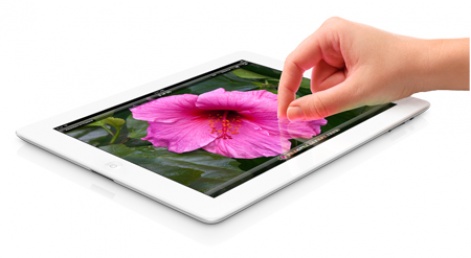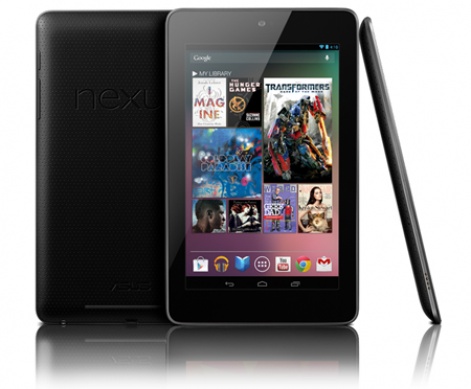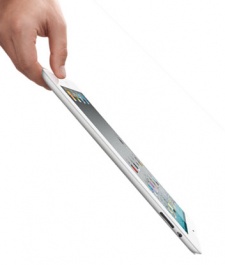No-one was surprised, then, when the part of my mind that deals with all things doom and gloom better known as all of it kicked into action when talk of a 7-inch 'iPad Mini' began to hit the web.
It's my view that, both for Apple and the thousands of developers that rely on iOS as their main source of income, the launch of such a device would signal the first major mistake the company has made since the death of Steve Jobs.
But this isn't a case of predicting whether an iPad Mini would sell or not.
I'll say this now: it would sell millions, most likely selling out for weeks post launch. This is a debate, however, that goes beyond any obvious short-term gain: for me, releasing a 7-inch iPad would represent an Apple that had lost control.
A matter of mind
For me, much of Apple's dominance when it comes to either iPhone or iPad has come from taking hold of consumer mind share.
It's only one element the App Store is the other major trigger in my view but it shouldn't be underestimated how much of an advantage being seen to lead most markets is in the eye of the average consumer.
Whether true or not, most people out there see Apple as the main driving force behind both touchscreen-based smartphones and tablets.

Some reports still peg iPad's market share at around 90%
While all operating systems 'borrow' elements from each other, by and large there's a general perception partially held up by weighty legal tussles that Apple innovates its products while others merely follow.
Under Jobs, Apple was reluctant to acknowledge that 7-inch tablets even exist, let alone raise the prospect of making one. There's a good reason for that the 7-inch tablet was arguably the first example of any of Apple's tablet rivals doing something original with their devices.
It was the first time Samsung and co. had attempted to provide their own definition as to what tablets were, and how they could be used.
History lesson
In contrast, in the first year or so after the launch of the original iPad, many of Apple's competitors launched perfectly decent alternatives that flopped, largely because the companies behind them had little idea what tablets were for, or why they were getting involved.
HP's TouchPad is a prime example of this: a product fuelled by the passion of the team behind the original webOS platform, undermined by executives who had no faith in the product and effectively wrote it off before it even launched.
To their credit, the likes of Samsung, Amazon, and Google have managed to find their own space in the tablet market: cheaper, smaller devices that, while never likely to draw too many consumers away from iPad, were the perfect purchase for consumers unwilling to spend £400 plus on such a device.
If Apple launches a 7-inch iPad, presumably at a lower price than the current SKU, then not only would the company be validating that market and following its rivals rather than leading, it would also find itself attempting to appeal to 'budget' consumers overnight.
All things to all men?
The mistake many people make is to assume that, to have a successful product, it has to appeal to everyone.
There is a reason, however, why supposedly 'luxury' car manufacturers don't panic and launch cheap budget models to try and compete with those operating at the lower end of the market: namely, they don't need to.

Google's Nexus 7 has rejuventated the Android tablet market
The car market is big enough to draw in consumers of all budgets at the same time. Mercedes, for instance, is hugely successful without having to produce a small, cheap three-seater designed to run elderly ladies to the supermarket.
In the same way, iPad is at the top end of the tablet market, and holds a majority share as a result.
While Galaxy Tab, Kindle Fire and Nexus 7 may prove that the low-end of the market is also a profitable one, that doesn't mean Apple has to abandon its position in order to mop up those sales as well.
After all, isn't appealing to the more budget-conscious consumer what iPad 2 was meant to do once its successor was unveiled?
A question of initiative
Of course, while writing this, I'm perfectly aware that many of you are already salivating over the prospect of an iPad Mini.
Having had a glorious six or so months with my PlayBook, I'm also of the opinion that 7-inch tablets are, in many ways, preferable to 10-inch plus models. I may even consider buying an iPad Mini as a replacement for my ageing original iPad should it ever hit the market.
But this is a question of playing the long game.
The moment Apple unveils an iPad Mini unless it does something miraculously revolutionary with the 7-inch form factor it will switch from the pace setter to the slouch at the back of the race attempting to mirror its rivals.
The only reason I could see Apple even entertaining the prospect of an iPad Mini would be in order to curtail the advance of cheaper, smaller Android-based tablets.
Ironically, however, by playing its rivals at their own game, Apple could find itself unwittingly handing over the initiative to those it now seems so desperate to stop.






















